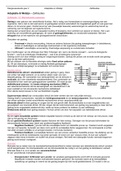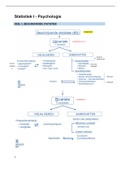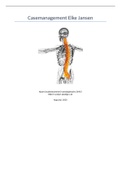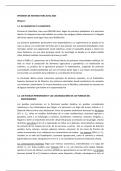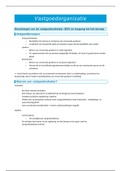INTERNATIONAL CRIMINAL LAW – COURSE PERIOD 5
TUTORIAL 1 - PREPARATION
LITERATURE:
. R. Cryer et al.: An Introduction to International Criminal Law and Procedure,
pp. 1-45 (introduction to international criminal law and its objectives), pp. 115-125 (early
international prosecutions), pp. 181-202 (hybrid and internationalized criminal courts)
. Göran Sluiter: Ad hoc international tribunals (Yugoslavia, Rwanda, Sierra
Leone), in William A. Schabas (ed.), The Cambridge Companion to International Criminal
Law, Cambridge University Press (2016), pp. 117-136 (reader)
. Leila Sadat: The International Criminal Court, in William A. Schabas (ed.),
The Cambridge Companion to International Criminal Law, Cambridge University Press
(2016), pp. 137-154 (reader)
QUESTIONS:
1) What is international criminal law? What are the objectives of international criminal
law? Why were international criminal tribunals established?
International criminal law is a body which imposes responsibilities on individuals and punishes
violations through international mechanisms.
International criminal law is a body of international rules designed both to proscribe certain categories
of conduct (war crimes, crimes against humanity, genocide, torture, aggression, international
terrorism) and to make those persons who engage in such conduct criminally liable. These rules
consequently authorize states or impose upon them the obligation, to prosecute and punish such
criminal conducts.
Another way to describe “international criminal law” is to look at the values it protects: in this
approach international crimes are considered of concern to the international community as a whole =
risk that it may imply a coherence that isn’t there.
Objectives of ICL: aims of ICl= two main aims are retribution and deterrence, incapacitation
(preventing crimes by keeping a person in detention), rehabilitation of offenders,
denunciation/education (engage offenders and attempt to make them understand what was wrong with
what they have done)
broader goals: justice for victims (closure for victims: either by seeing their persecutors prosecuted
or by testifying), recording history (set down a permanent record of the crimes), post-conflict
reconciliation (“no peace without justice”), further asserted benefits of international trials (claimed
that international judges are best judhes of international crimes because 1) are representative of the
relevant community affected by international crimes and 2) are more familiar with relevant law; better
,able to investigate and prosecute offences which occur across borders; provide for some uniformity in
the process and law for punishing international crimes)
Why an international criminal court? A lot of heinous crimes remained unpunished by national courts,
so there was a need for an international criminal court to seek justice and punish these crimes.
2) The Nuremberg and Tokyo Tribunals were qualified by some as ‘victor’s justice’. Do
you think that was justified? And if so, would you regard the existing tribunals also as
exponents of ‘victor’s justice’?
Victor’s justice= not always clear precisely what this concept is. It contains a number of linked, but
different allegations. These are that the trials itself was not fair, in particular that the judges were
biased against the accused, that the applicable law was designed to guarantee a conviction and that
similar acts were committed by the prosecuting State(s) but were not prosecuted.
Trials not fair? Some aspects of Nuremberg trial were imperfect: for example, heavy reliance on
affidavit evidence (beëdigde verklaring) and huge disparity in resources between prosecution and
defence; book states however that given the standards applicable to trials at the time, proceedings were
basically fairly run.
case can be made that the presence of neutral judges or a judge from Germany would have
increased the legitimacy of the proceedings.
law? The law on crimes against humanity and peace was defined by the Allies in London with the
actions of the Nazis in mind and at least in relation to crimes against peace the carter was, in essence
ex post facto legislation. But can be doubted that the Nazis truly thought their actions weren’t criminal
according to principles of law recognized by the community of nations.
defence was not permitted to raise the issue of crimes committed by the Allies, but to quoque-
argyment was raised by alleging that unrestricted submarine warfare was permitted by customary
international law.
Same critiques are applicable to the Tokyo Trial, but in relation with conspiracy and command
responsibility went too far
3) Do you think it is a good idea to have tribunals far away from the place where the crimes
were committed? What are the advantages and disadvantages?
Advantage: some detachment (I would think less bias).
Disadvantage: often located far away from the places where the crimes occurred, which means that
they are often inaccessible to many of the victims and seend as responding more to an international
audience that the purported beneficiaries. Often domestic resistance there because of misrepresentation
of tgeir work and allegations of bias. Also a lack of “ownership” of international tribunals at local
level: such tribunals focus on those most responsible, but most victims will not see their immediate
oppressors punished.
4) What is the difference between the ad hoc tribunals and the ICC? What are hybrid or
internationalized tribunals? Which ones exist?
,Ad hoc tribunal is specialized e.g. ICTY prosecutes ar crimes, crimes against humanity, and crimes of
genocide committed on the territory of Ex-Yugoslavia from 1991 onwards.
The main points are that this tribunal is
- temporary,
- it prosecutes serious crimes on one territory (limited to the territories of States where the
crimes were committed),
- as a starting date the year was chosen in which the conflict started (ICTY) or period in the
conflict from which moment on the most serious crimes were considered to have been
committed (Special Court Sierra Leone) or year in which genocide took place (Rwanda)
o no end-date for ICTY which made it possible to deal with crimes committed in
context of Kosovo and Macedonia independence wars.
- and the powers of the prosecutor are much more developed.
<-> The International Criminal Court is permanent, and state participation is voluntary. It prosecutes
the same crimes as the ICTY, plus the crime of aggression. It has been operational since 2002, and the
prosecutor has more limited powers.
Ad hoc: ICTY (International Criminal Court for former Yugoslavia), International Criminal Court for
Rwanda,
Special Court for Sierra Leone is a bit hybrid: mixed because also a place for application of national
law.
Internationalized tribunals: The international community has also cooperated with national
governments to establish “internationalized” tribunals to prosecute international crimes. These courts
may operate exclusively within a national judicial system or may have been established by an
agreement between the United Nations and the national government, and as such, their staffing and
judicial composition may be national or international in nature.
E.g.: Nuremberg Tribunal, Tokyo trials, Special Court for Sierra Leone, Extraordinary Chambers in
the Courts of Cambodia, Special Tribunal for Lebanon, Serious Crimes Panels of the Dili District
Court (East Timor), Regulation 64 Panels of Kosovo, War Crimes Chamber of the Court of Bosnia
and Herzegovina, Special Department for Adjudicating in Trials Against Perpetrators of War Crimes
of the Belgrade District Court (Serbia), Iraqi Special Tribunal, Scottish High Court of Justiciary sitting
in the Netherlands (Lockerbie trial)
5) What is meant by the ‘completion strategy’? What is the ‘residual mechanism’?
The ICTY was established in 1993 as a temporary institution, for the specific purpose of investigating
crimes committed during the wars in the former Yugoslavia and prosecuting those responsible. This
was done at a time when the domestic judicial systems in the former Yugoslavia were not able or
willing to do so themselves. By 2003, ten years after its establishment, the Tribunal was operating at
, full capacity while the various national judicial systems in the region demonstrated varying degrees of
intent to improve their ability to handle war crimes cases. Consequently, the Tribunal's judges took the
initiative of devising a plan which became known as the 'completion strategy'. Its purpose is to make
sure that the Tribunal concludes its mission successfully, in a timely way and in coordination with
domestic legal systems in the former Yugoslavia.
The Mechanism for International Criminal Tribunals (“Mechanism” or “MICT”), formally referred to
as the International Residual Mechanism for Criminal Tribunals, is mandated to perform a number of
essential functions previously carried out by the International Criminal Tribunal for Rwanda (“ICTR”)
and the International Criminal Tribunal for the former Yugoslavia (“ICTY”). In carrying out its
multiple functions – as listed below – the Mechanism maintains the legacies of these two pioneering
ad hoc international criminal courts and strives to reflect best practices in the field of international
criminal justice
to perform the remaining functions of the International Criminal Tribunal for the former
Yugoslavia (ICTY) and the International Criminal Tribunal for Rwanda (ICTR) following the
completion of those tribunals' respective mandates.
The United Nations Security Council created the Mechanism on 22 December 2010 as a “small,
temporary and efficient structure”. The Mechanism started operating on 1 July 2012 in Arusha, United
Republic of Tanzania, and on 1 July 2013 in The Hague, the Netherlands. The Arusha branch has
inherited functions from the ICTR, and the Hague branch will continue to inherit functions from the
ICTY until that Tribunal’s closure.
During the initial years of the Mechanism’s existence, it operated in parallel with the ICTR and the
ICTY, and it will continue to operate after the Tribunals’ closure. The ICTR closed on 31 December
2015 with the ICTY following on 31 December 2017.
6) What are the sources of ICL? Is there any difference between the sources of ICL
according to art. 21 of the Rome Statute and art. 38 of the ICJ Statute? According to art.
21 of the Rome Statute, is there a hierarchy of the applicable sources of law?
Sources are usually considered those of art. 38 ICJ-statute: treaty law, customary law (law that derives
from practice of states accompanied by opinion juris= belief that what is done is required by or in
accordance with law), general principles of law and as subsidiairy means of determining the law,
judicial decisions and writings of most qualified publicists. Sources of ICC are analogous to ICJ-
sources, but not identical.
Article 21 ICC statute lays down the documents the court
Art. 21 Lays down the rules the Court SHALL apply (primary sources: statutes, Elements of Crimes
and its Rules of Procedure and Evidence;
Case law:
- ICTY, Decision on the Defence Motion for Interlocutory Appeal on Jurisdiction,
Prosecutor v. Tadic, Case No. IT-94-1-AR72, Appeals Chamber, 2 October 1995, par. 9-48
TUTORIAL 1 - PREPARATION
LITERATURE:
. R. Cryer et al.: An Introduction to International Criminal Law and Procedure,
pp. 1-45 (introduction to international criminal law and its objectives), pp. 115-125 (early
international prosecutions), pp. 181-202 (hybrid and internationalized criminal courts)
. Göran Sluiter: Ad hoc international tribunals (Yugoslavia, Rwanda, Sierra
Leone), in William A. Schabas (ed.), The Cambridge Companion to International Criminal
Law, Cambridge University Press (2016), pp. 117-136 (reader)
. Leila Sadat: The International Criminal Court, in William A. Schabas (ed.),
The Cambridge Companion to International Criminal Law, Cambridge University Press
(2016), pp. 137-154 (reader)
QUESTIONS:
1) What is international criminal law? What are the objectives of international criminal
law? Why were international criminal tribunals established?
International criminal law is a body which imposes responsibilities on individuals and punishes
violations through international mechanisms.
International criminal law is a body of international rules designed both to proscribe certain categories
of conduct (war crimes, crimes against humanity, genocide, torture, aggression, international
terrorism) and to make those persons who engage in such conduct criminally liable. These rules
consequently authorize states or impose upon them the obligation, to prosecute and punish such
criminal conducts.
Another way to describe “international criminal law” is to look at the values it protects: in this
approach international crimes are considered of concern to the international community as a whole =
risk that it may imply a coherence that isn’t there.
Objectives of ICL: aims of ICl= two main aims are retribution and deterrence, incapacitation
(preventing crimes by keeping a person in detention), rehabilitation of offenders,
denunciation/education (engage offenders and attempt to make them understand what was wrong with
what they have done)
broader goals: justice for victims (closure for victims: either by seeing their persecutors prosecuted
or by testifying), recording history (set down a permanent record of the crimes), post-conflict
reconciliation (“no peace without justice”), further asserted benefits of international trials (claimed
that international judges are best judhes of international crimes because 1) are representative of the
relevant community affected by international crimes and 2) are more familiar with relevant law; better
,able to investigate and prosecute offences which occur across borders; provide for some uniformity in
the process and law for punishing international crimes)
Why an international criminal court? A lot of heinous crimes remained unpunished by national courts,
so there was a need for an international criminal court to seek justice and punish these crimes.
2) The Nuremberg and Tokyo Tribunals were qualified by some as ‘victor’s justice’. Do
you think that was justified? And if so, would you regard the existing tribunals also as
exponents of ‘victor’s justice’?
Victor’s justice= not always clear precisely what this concept is. It contains a number of linked, but
different allegations. These are that the trials itself was not fair, in particular that the judges were
biased against the accused, that the applicable law was designed to guarantee a conviction and that
similar acts were committed by the prosecuting State(s) but were not prosecuted.
Trials not fair? Some aspects of Nuremberg trial were imperfect: for example, heavy reliance on
affidavit evidence (beëdigde verklaring) and huge disparity in resources between prosecution and
defence; book states however that given the standards applicable to trials at the time, proceedings were
basically fairly run.
case can be made that the presence of neutral judges or a judge from Germany would have
increased the legitimacy of the proceedings.
law? The law on crimes against humanity and peace was defined by the Allies in London with the
actions of the Nazis in mind and at least in relation to crimes against peace the carter was, in essence
ex post facto legislation. But can be doubted that the Nazis truly thought their actions weren’t criminal
according to principles of law recognized by the community of nations.
defence was not permitted to raise the issue of crimes committed by the Allies, but to quoque-
argyment was raised by alleging that unrestricted submarine warfare was permitted by customary
international law.
Same critiques are applicable to the Tokyo Trial, but in relation with conspiracy and command
responsibility went too far
3) Do you think it is a good idea to have tribunals far away from the place where the crimes
were committed? What are the advantages and disadvantages?
Advantage: some detachment (I would think less bias).
Disadvantage: often located far away from the places where the crimes occurred, which means that
they are often inaccessible to many of the victims and seend as responding more to an international
audience that the purported beneficiaries. Often domestic resistance there because of misrepresentation
of tgeir work and allegations of bias. Also a lack of “ownership” of international tribunals at local
level: such tribunals focus on those most responsible, but most victims will not see their immediate
oppressors punished.
4) What is the difference between the ad hoc tribunals and the ICC? What are hybrid or
internationalized tribunals? Which ones exist?
,Ad hoc tribunal is specialized e.g. ICTY prosecutes ar crimes, crimes against humanity, and crimes of
genocide committed on the territory of Ex-Yugoslavia from 1991 onwards.
The main points are that this tribunal is
- temporary,
- it prosecutes serious crimes on one territory (limited to the territories of States where the
crimes were committed),
- as a starting date the year was chosen in which the conflict started (ICTY) or period in the
conflict from which moment on the most serious crimes were considered to have been
committed (Special Court Sierra Leone) or year in which genocide took place (Rwanda)
o no end-date for ICTY which made it possible to deal with crimes committed in
context of Kosovo and Macedonia independence wars.
- and the powers of the prosecutor are much more developed.
<-> The International Criminal Court is permanent, and state participation is voluntary. It prosecutes
the same crimes as the ICTY, plus the crime of aggression. It has been operational since 2002, and the
prosecutor has more limited powers.
Ad hoc: ICTY (International Criminal Court for former Yugoslavia), International Criminal Court for
Rwanda,
Special Court for Sierra Leone is a bit hybrid: mixed because also a place for application of national
law.
Internationalized tribunals: The international community has also cooperated with national
governments to establish “internationalized” tribunals to prosecute international crimes. These courts
may operate exclusively within a national judicial system or may have been established by an
agreement between the United Nations and the national government, and as such, their staffing and
judicial composition may be national or international in nature.
E.g.: Nuremberg Tribunal, Tokyo trials, Special Court for Sierra Leone, Extraordinary Chambers in
the Courts of Cambodia, Special Tribunal for Lebanon, Serious Crimes Panels of the Dili District
Court (East Timor), Regulation 64 Panels of Kosovo, War Crimes Chamber of the Court of Bosnia
and Herzegovina, Special Department for Adjudicating in Trials Against Perpetrators of War Crimes
of the Belgrade District Court (Serbia), Iraqi Special Tribunal, Scottish High Court of Justiciary sitting
in the Netherlands (Lockerbie trial)
5) What is meant by the ‘completion strategy’? What is the ‘residual mechanism’?
The ICTY was established in 1993 as a temporary institution, for the specific purpose of investigating
crimes committed during the wars in the former Yugoslavia and prosecuting those responsible. This
was done at a time when the domestic judicial systems in the former Yugoslavia were not able or
willing to do so themselves. By 2003, ten years after its establishment, the Tribunal was operating at
, full capacity while the various national judicial systems in the region demonstrated varying degrees of
intent to improve their ability to handle war crimes cases. Consequently, the Tribunal's judges took the
initiative of devising a plan which became known as the 'completion strategy'. Its purpose is to make
sure that the Tribunal concludes its mission successfully, in a timely way and in coordination with
domestic legal systems in the former Yugoslavia.
The Mechanism for International Criminal Tribunals (“Mechanism” or “MICT”), formally referred to
as the International Residual Mechanism for Criminal Tribunals, is mandated to perform a number of
essential functions previously carried out by the International Criminal Tribunal for Rwanda (“ICTR”)
and the International Criminal Tribunal for the former Yugoslavia (“ICTY”). In carrying out its
multiple functions – as listed below – the Mechanism maintains the legacies of these two pioneering
ad hoc international criminal courts and strives to reflect best practices in the field of international
criminal justice
to perform the remaining functions of the International Criminal Tribunal for the former
Yugoslavia (ICTY) and the International Criminal Tribunal for Rwanda (ICTR) following the
completion of those tribunals' respective mandates.
The United Nations Security Council created the Mechanism on 22 December 2010 as a “small,
temporary and efficient structure”. The Mechanism started operating on 1 July 2012 in Arusha, United
Republic of Tanzania, and on 1 July 2013 in The Hague, the Netherlands. The Arusha branch has
inherited functions from the ICTR, and the Hague branch will continue to inherit functions from the
ICTY until that Tribunal’s closure.
During the initial years of the Mechanism’s existence, it operated in parallel with the ICTR and the
ICTY, and it will continue to operate after the Tribunals’ closure. The ICTR closed on 31 December
2015 with the ICTY following on 31 December 2017.
6) What are the sources of ICL? Is there any difference between the sources of ICL
according to art. 21 of the Rome Statute and art. 38 of the ICJ Statute? According to art.
21 of the Rome Statute, is there a hierarchy of the applicable sources of law?
Sources are usually considered those of art. 38 ICJ-statute: treaty law, customary law (law that derives
from practice of states accompanied by opinion juris= belief that what is done is required by or in
accordance with law), general principles of law and as subsidiairy means of determining the law,
judicial decisions and writings of most qualified publicists. Sources of ICC are analogous to ICJ-
sources, but not identical.
Article 21 ICC statute lays down the documents the court
Art. 21 Lays down the rules the Court SHALL apply (primary sources: statutes, Elements of Crimes
and its Rules of Procedure and Evidence;
Case law:
- ICTY, Decision on the Defence Motion for Interlocutory Appeal on Jurisdiction,
Prosecutor v. Tadic, Case No. IT-94-1-AR72, Appeals Chamber, 2 October 1995, par. 9-48



